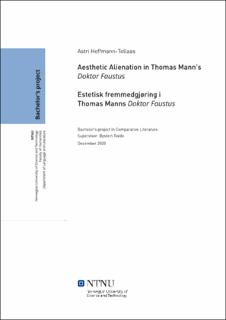| dc.contributor.advisor | Tvede, Øystein | |
| dc.contributor.author | Hoffmann-Tollaas, Astri | |
| dc.date.accessioned | 2021-09-24T18:34:11Z | |
| dc.date.available | 2021-09-24T18:34:11Z | |
| dc.date.issued | 2020 | |
| dc.identifier | no.ntnu:inspera:67147510:50650351 | |
| dc.identifier.uri | https://hdl.handle.net/11250/2781928 | |
| dc.description.abstract | Formålet med denne oppgaven er å undersøke forskjellige aspekter av ‘estetisk fremmedgjøring’ i Thomas Manns roman Doktor Faustus fra 1947. Istedenfor å forklare Adrian Leverkühn sitt avansement som komponist som allegorisk parallell til nasjonalsosialismens dominans i Tyskland og Europa, noe mange forskere allerede har gjort, vil jeg vise at Doktor Faustus tematiserer den moderne kunstens krise helt uavhengig av romanens sosiopolitiske bakgrunn. Som et resultat av et intensivt samarbeid mellom Thomas Mann og hans kollega Theodor Wiesengrund Adorno, inneholder romanen faktisk deler av begges estetiske syn: Ved å svare på spørsmålet hvordan Mann sin estetiske forståelse er presentert i romanen og på hvilken måte den skiller seg fra Adornos, vil jeg vise at den moderne kunstens krise er et sentralt tema i Doktor Faustus. Da Mann ble konfrontert med Adornos musikkfilosofi, var han nødt til å skape en unik blanding av både sitt eget dekadente kunstsyn og Adornos mer optimistiske forståelse. Ved å ta Jay Bernsteins definisjon av ‘estetisk fremmedgjøring’ som mitt utgangspunkt, vil jeg vise at Adrian Leverkühns tragiske fall representerer den moderne kunstens tragiske skjebne. | |
| dc.description.abstract | This thesis seeks to analyze the various levels of ‘aesthetic alienation’ in Thomas Mann’s novel Doktor Faustus, first published by Beermann-Fischer Verlag in 1947. Instead of explaining Adrian Leverkühn’s rise as a composer through the socio-political lenses of German national socialism, as many scholars have already done, I want to show that Mann’s Doktor Faustus thematizes the crisis of modern art regardless of its socio-political background. As a product of regular exchange of ideas between Thomas Mann and his colleague Theodor Wiesengrund Adorno, Doktor Faustus in fact contains fragments of both aesthetic views: By answering the question how Mann’s view on ‘aesthetic alienation’ is presented in his novel and how it dramatically differs from Adorno’s, I want to show that the crisis of modern art is a central issue in Mann’s novel. When confronted with Adorno’s philosophy of music, Thomas Mann was forced to create a unique blend of his own decadent views on the fate of aesthetics, substantially influenced by Richard Wagner, Friedrich Nietzsche and Arthur Schopenhauer, and Adorno’s more optimistic understanding. By taking Jay Bernstein’s definition of the ‘aesthetic alienation’ term as my starting point, my analysis will show that Adrian Leverkühn’s tragic downfall impersonates the ominous fate of modern art. | |
| dc.language | | |
| dc.publisher | NTNU | |
| dc.title | Aesthetic Alienation in Thomas Mann's Doktor Faustus | |
| dc.type | Bachelor thesis | |
